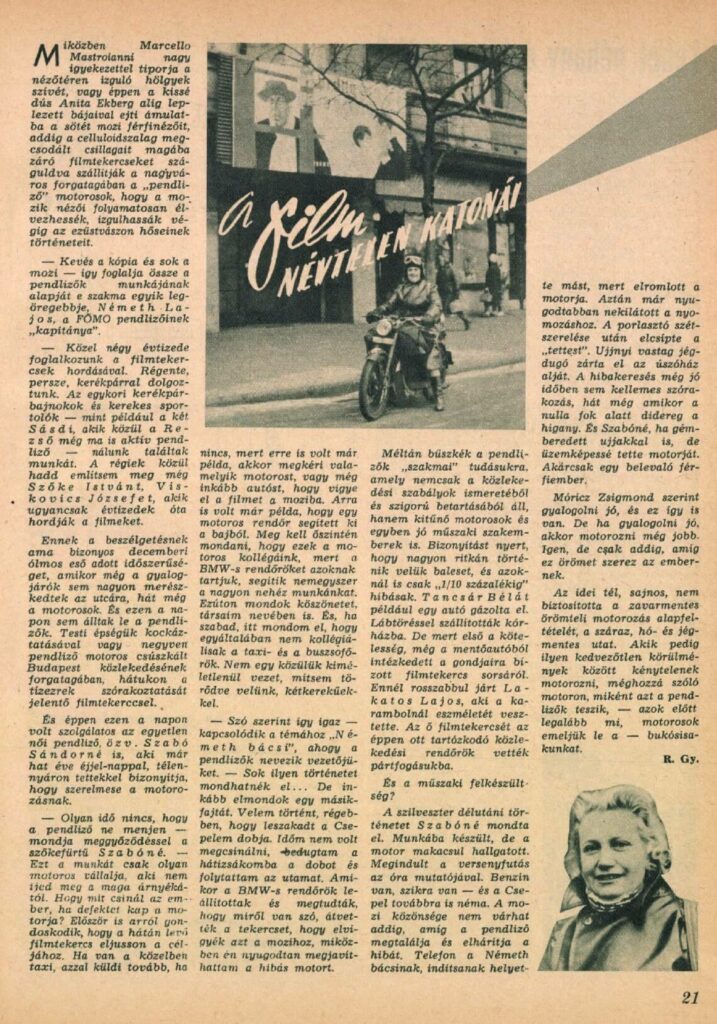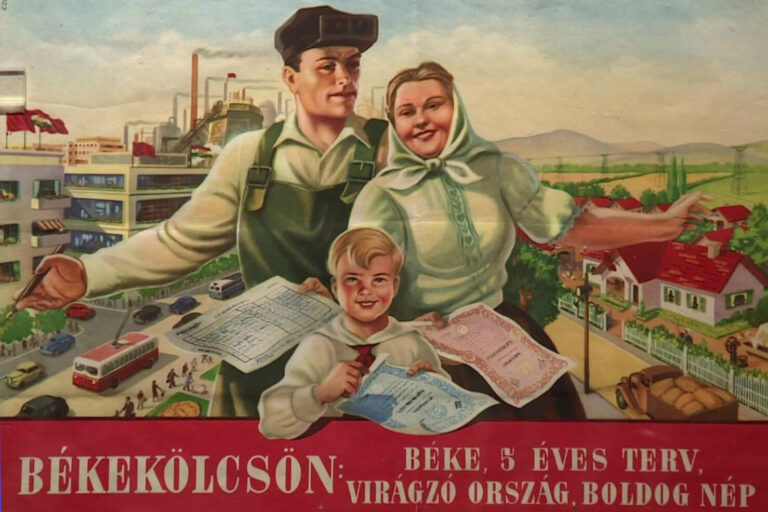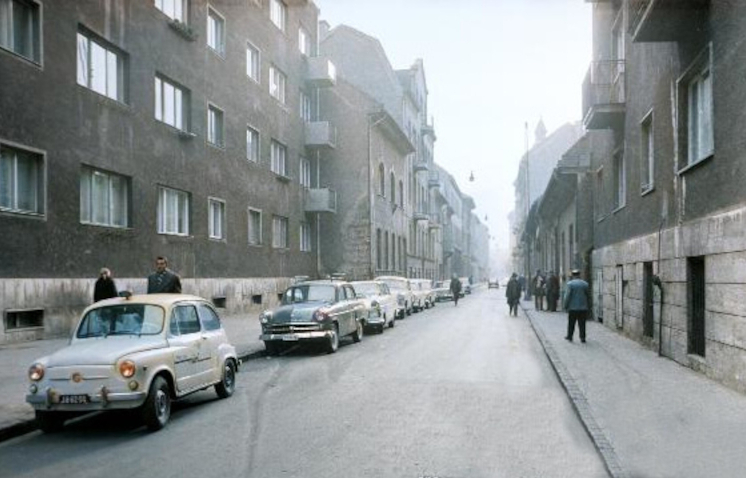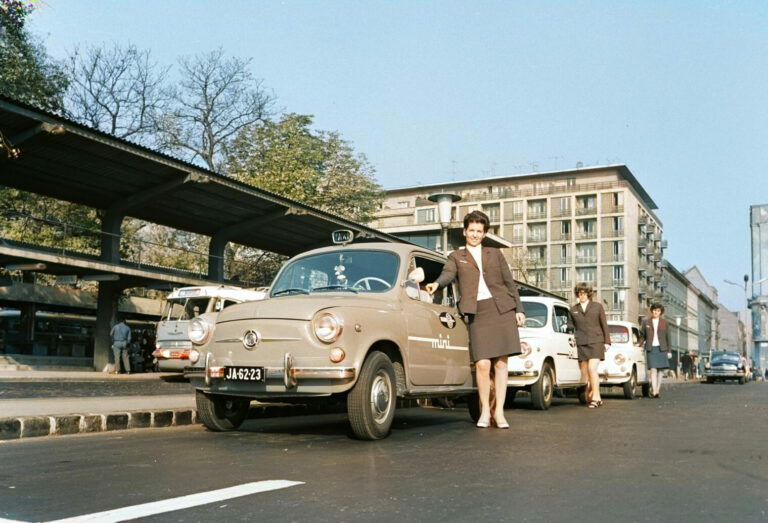1964 - Who were the "commuters"?
From Car Engine 1964 In the 21 January issue, readers of the time will find - among other things - the "Pendants" in a full-page paper, which read "Few copies and many cinemas."
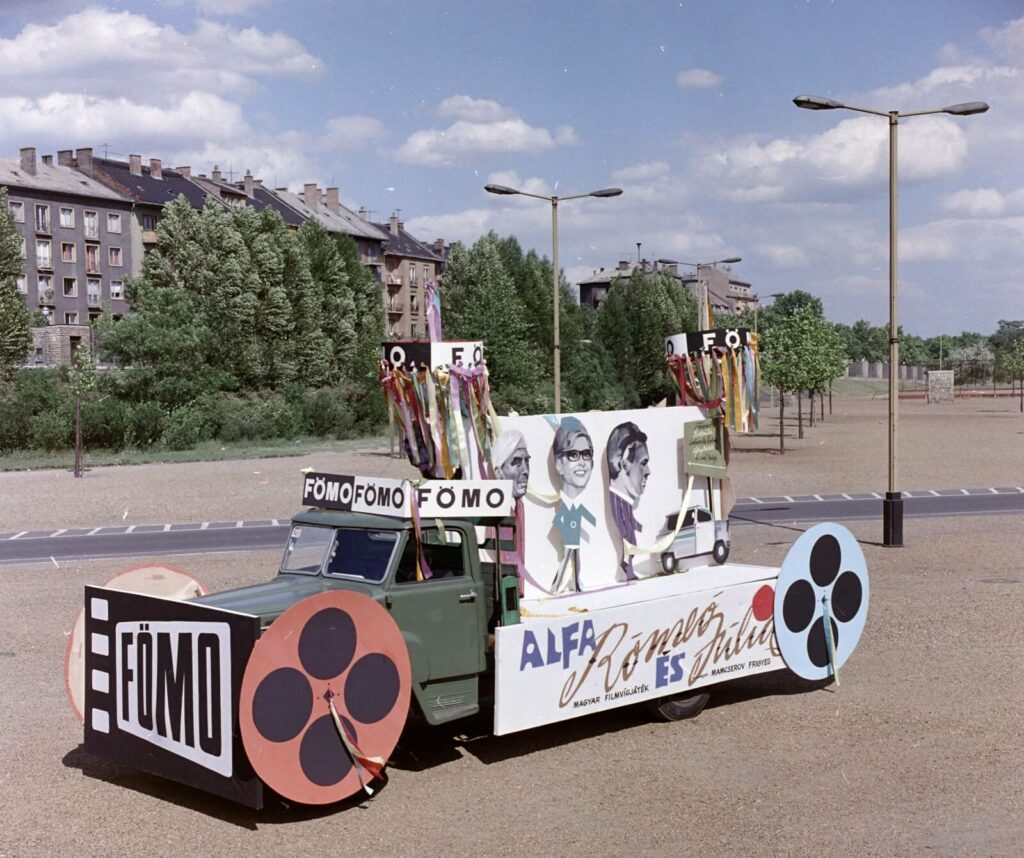
Budapest XIV, 1969, the area near the Népstadion, with the Stefánia (Népstadion) road in the background. Poster of the film distributed by the Budapest Cinema Company (FŐMO) on a truck parading during the Actors-Journalists' Ranking (SZÚR). Image source.
But who were the "commuters", also known as the film buffs?
The job of film journalist is almost as old as cinema. Until the digital switchover in the 2000s, cinemas received films on 35 mm prints. Since a reel contained on average fifteen to twenty minutes of material, it is easy to calculate that a complete film could consist of five to eight reels, which also weighed a considerable amount. Even in the 1990s, it is difficult to imagine how many thousands of copies of a film had to be produced for a world premiere in order to be shown from Sydney to Tokyo, from Paris to Budapest, at roughly the same time. The production costs of these analogue prints were also very high, so distributors always produced or ordered the smallest possible quantity, still just enough.
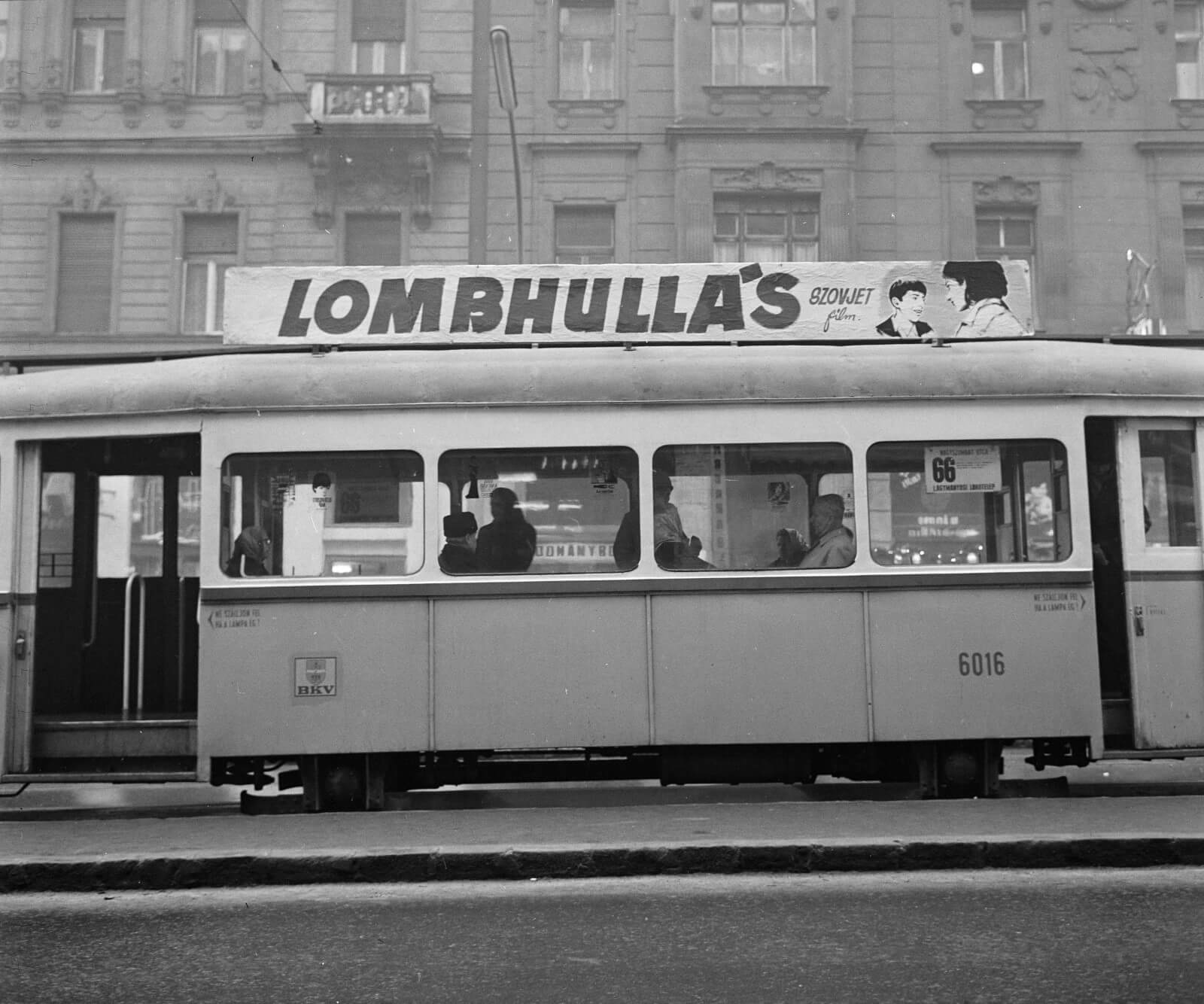
Hungary, 1968 Budapest Budapest V.Budapest XIII Szent István körút, tram stop at Jászai Mari tér, in the background the houses number 3 and 1. Poster of the film distributed by the Budapest Cinema Company (FŐMO). Image source.
Copies travelled between cinemas, both within and outside cities, and in this travelling, the "film couriers", a special profession, played a key role.
In Hungary in the 1950s and 1960s, film courier work was considered an absolutely confidential job at the distributor Mokép (formerly FŐMO), so the positions were mostly filled by family members of those working at the HM and the BM. Otherwise known as commuters, the couriers were responsible for ensuring that the film reels got from cinema to cinema in the city on time and intact.
Interesting fact: the Red Star cinema had to show Hell's Tower for three and a half years because the audience loved it so much. Whenever someone else wanted to play it, parts of the print would circulate around the theatres. And the couriers were busy with them, not stopping until 8 p.m., except for petrol.
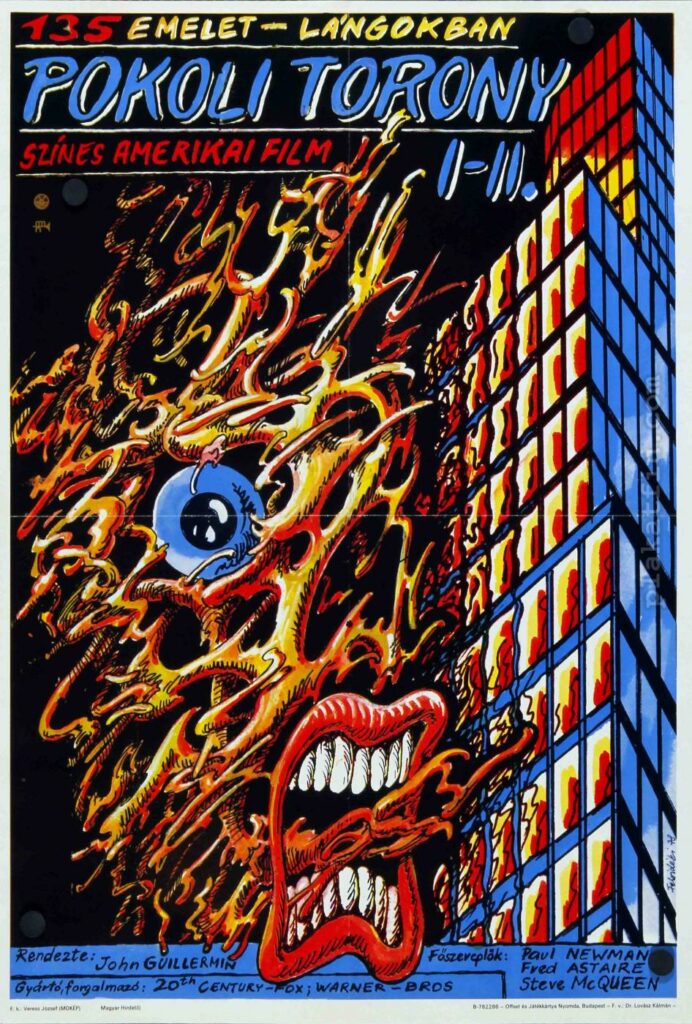
The poster of the film which gave the couriers a hard time. Image source: plakatfiu.com
Below are the Car Engine 1964 January 21, R.Gy., and you can also find the original newspaper page in high resolution in the gallery at the end of the post.
♠
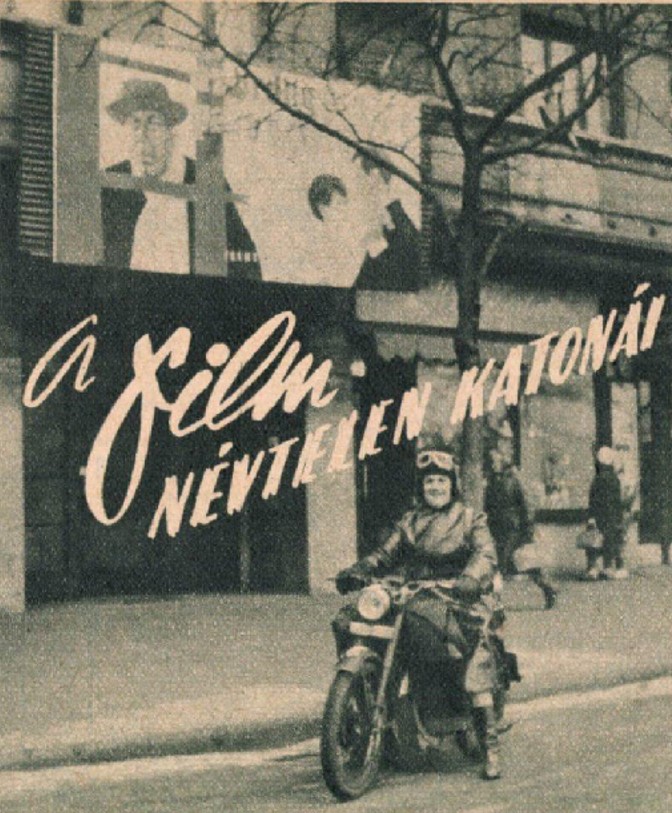
While Marcello Mastroianni stomps his way into the hearts of the ladies in the audience, or the slightly plump Anita Ekberg with her barely concealed charms, she wows the male audience of the dark cinema, while film reels containing the admired stars of the celluloid strip are transported through the city by "commuting" motorbikes, so that cinema-goers can enjoy and thrill to the stories of the silver screen heroes.

Anita Ekberg Image source: mubi.com
- Few copies and a lot of cinema - this is how one of the oldest members of the profession, Lajos Németh, the "captain" of the FŐMO pendulum players, sums up the basis of the pendulum players' work.
- We have been carrying film reels for almost four decades. We used to work by bicycle, of course. Former cycling champions and wheeled athletes - like the two Sásdi, Rezső of whom is still an active commuter - found work with us. Among the old-timers, let me also mention István Szőke, József Viskovics, who have also been carrying films for decades.
The timing of this conversation was given by a certain December lead rain, when even pedestrians, let alone motorcyclists, were reluctant to venture out on the streets. And on this day, the commuters didn't stop either. At the risk of their physical safety, forty or so commuting motorcyclists glided through Budapest's traffic, film reels on their backs to entertain tens of thousands.
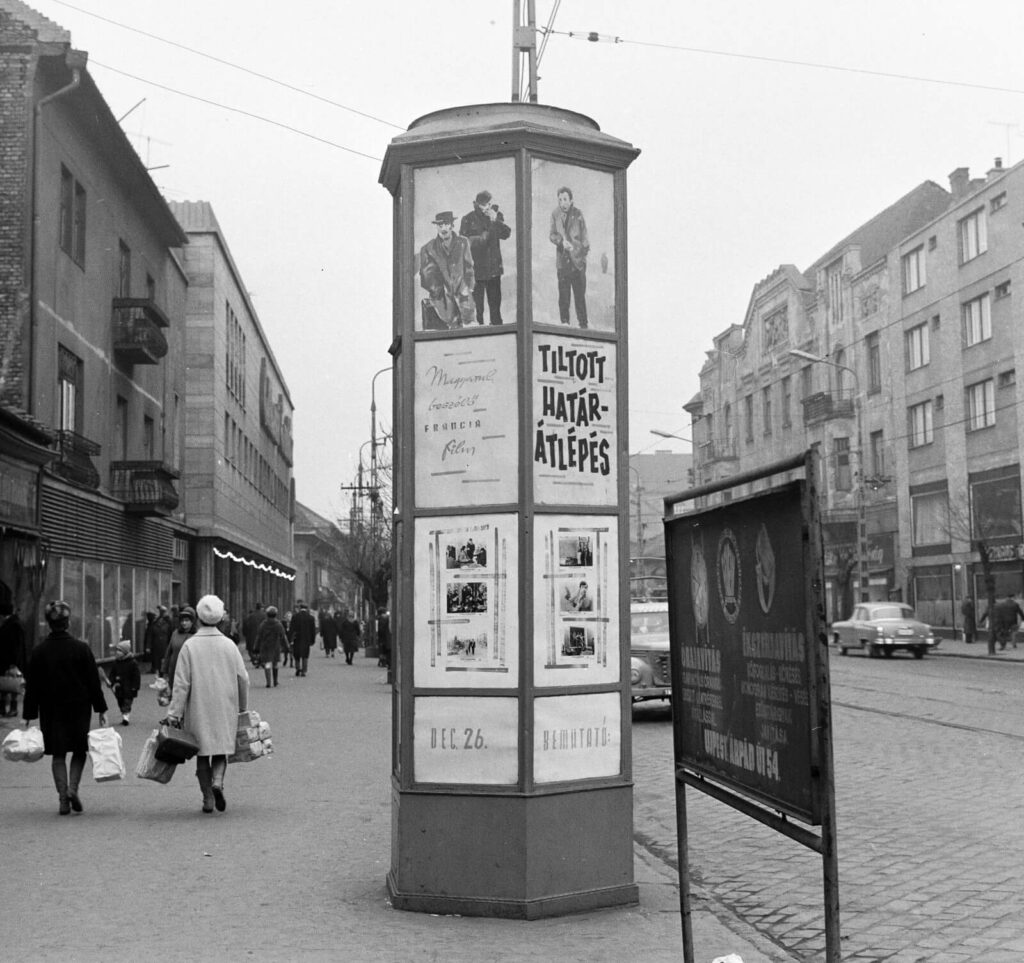
1968, Budapest IV., Árpád út looking towards István (Bajcsy-Zsilinszky) út, State Store on the left. In the foreground, an advertisement for a film distributed by the Budapest Cinema Company (FÖMO) Image source.
And it was on this day that the only female commuter, Sándorné Szabó, widowed, was also on duty, who has been proving her love of motorcycling for six years, day and night, winter and summer.
- There's no time when the commuter doesn't go," says the blonde-haired Szabón with conviction, "Only a biker who isn't afraid of his own shadow will take this job. What do you do if your bike has a puncture? First of all, you make sure that the roll of film on your back gets to its destination. If there is a taxi nearby, he sends it on; if not, as has happened before, he asks a motorcyclist, or even better, a driver, to take the film to the cinema. There have also been cases where a policeman on a motorbike has helped you out of trouble. I have to say frankly that these are our motorcycle colleagues, because we consider BMW police officers to be so, and they help us in our very difficult work. I would like to take this opportunity to thank them on behalf of my colleagues. And, if I may, I will say here that taxi and bus drivers are not at all collegial. More than one of them drives ruthlessly, with no regard for us two-wheelers.
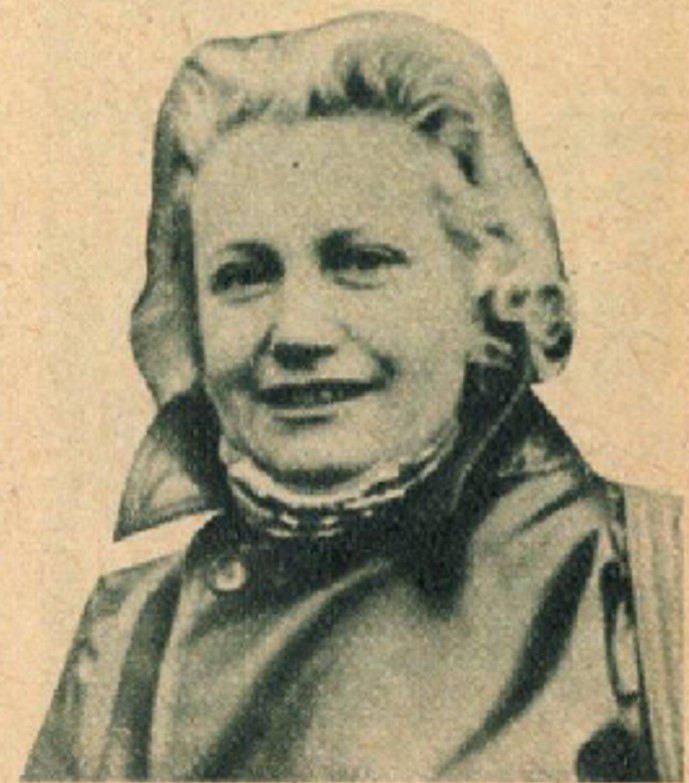
The only female pendant, the blonde-haired widow Mrs. Szabón.
- It's literally true - "Uncle Németh", as the commuters call their leader, joins in - I could tell you many such stories... But I'll tell you another kind. It happened to me, a long time ago, that the drum of my Csepelem broke off. I didn't have time to fix it, so I put the drum in my backpack and went on my way. When the BMW cops stopped me and found out what was going on, they took the reel to the cinema, while I could repair the faulty engine in peace.
The commuters are justifiably proud of their "professional" skills, which not only include knowledge of the traffic rules and strict observance of them, but also being excellent motorcyclists and good technicians. It has been proven that they are very rarely involved in accidents, and that they are only "1/10th" at fault. For example, Béla Tancsár was hit by a car. He was taken to hospital with a broken leg. But because duty comes first, he arranged the fate of the film reel entrusted to his care from the ambulance. Lakatos Lajos, who lost consciousness in the collision, fared worse. His film reel was taken into the care of the traffic police officers who were on the scene.
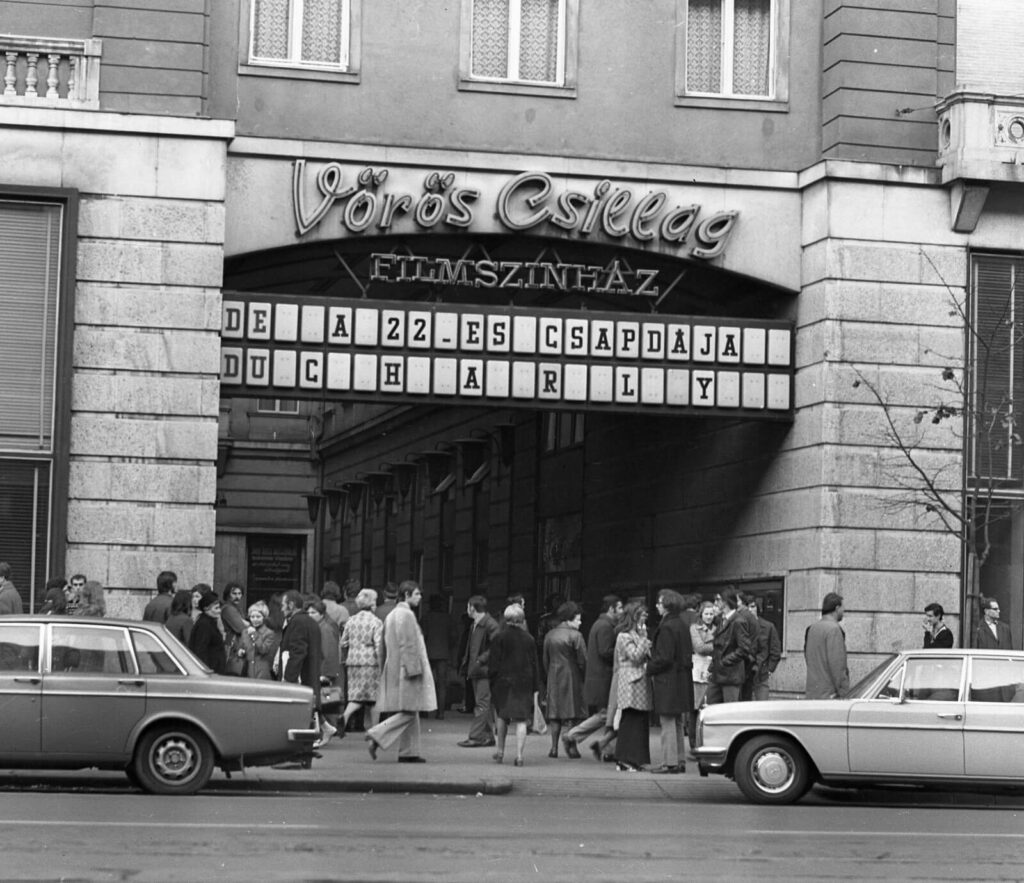
1977, Budapest VII. Erzsébet (Lenin) Boulevard, Red Star Cinema. Image source.
And technical readiness?
The New Year's Eve story was told by Mrs Szabón. She was about to go to work, but the engine was stubbornly silent. The clock started to race. There was petrol, there was a spark and Csepel remained silent. The cinema audience could not wait for the pendulum to find and rectify the fault. Phone Uncle Németh and tell him to start someone else because his engine is broken. Then he set to investigating more calmly. After dismantling the carburettor, he caught the "culprit". There was a finger-thick sheet of ice blocking the bottom of the floating house. Troubleshooting is no fun, even in good weather, let alone when the mercury is freezing below zero. And Mrs Szabón, with numb fingers, got her engine running.
Just like a man with guts.
Zsigmond Móricz said that walking is good, and it is. But if walking is good, riding a motorbike is even better. Yes, but only as long as it gives you pleasure.
This winter, unfortunately, has not provided the basic condition for trouble-free, enjoyable motorcycling: dry, snow- and ice-free roads. And for those who are forced to ride in such adverse conditions - on a solo motorbike, as commuters do - at least we motorcyclists have to take off our helmets.
R. Gy.
